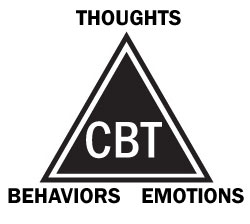 Cognitive Behavioral Therapy has become a buzzword in addiction treatment. Everybody claims to be using it nowadays, although I don’t think that’s really the case, or perhaps more accurately, they’re not using it optimally. But that’s another discussion for another day. For now, I want to discuss the basic theory behind CBT, because it’s a wonderfully helpful theory (or dare I say truth of life), even if the therapeutic application of it leaves much to be desired.
Cognitive Behavioral Therapy has become a buzzword in addiction treatment. Everybody claims to be using it nowadays, although I don’t think that’s really the case, or perhaps more accurately, they’re not using it optimally. But that’s another discussion for another day. For now, I want to discuss the basic theory behind CBT, because it’s a wonderfully helpful theory (or dare I say truth of life), even if the therapeutic application of it leaves much to be desired.
First, CBT is not one thing. There are multiple versions of it, the most popular being Aaron Beck’s Cognitive Therapy, and Albert Ellis’s Rational Emotive Behavior Therapy (REBT). But the thing that all of these therapies have in common is one basic premise: that your thoughts determine your feelings and behaviors.
That’s the most important part of the theory in a nutshell. Another way of looking at this idea is found in the oft mentioned (by CBT practitioners) quote from the Stoic philosopher Epictetus: “Men are disturbed not by things, but by the view which they take of them.”
It’s really an intuitive philosophy, and easy to grab hold of. It’s so obvious that even I reached the same conclusion years ago before I’d ever read a single word about CBT. It just makes sense.
But now how do you apply this wisdom? Well, in CBT, the message is generally: if you want to feel and act differently, then you should think differently.
The next questions that arise are:
- Which thoughts are causing my unfavorable feelings and behaviors?
- Which wider personal beliefs are part of my thoughts?
- Am I willing to change my thoughts and beliefs?
- If so, what thoughts and beliefs would bring the results I want?
If we do want to change our emotional life and our behaviors, then the basic Cognitive Behavioral theory and the questions it inspires, give us a lot to bite into. It gives us a way to change.
But there is another important question to consider, the answer to which is tremendously important to the application of the lesson “thoughts determine feelings and behavior”: How do I change my thoughts and beliefs?
And now it gets deep. Some people may not believe that they can choose their own thoughts and beliefs! Some people may believe that an outside force is needed to change their thoughts and beliefs! Those people would likely put themselves in a subservient role to a therapist or some other authority figure who they believe can change their thoughts. They would expect the therapist to answer all the questions in the list above. The therapist, depending on their beliefs, may or may not take on this role. It may or may not be an effective application of the lesson.
And yet others may believe that if they just understand the lesson, they can set about changing their thoughts on their own. These people would take the helm in answering the questions above, exercising their own judgment and powers of reason and choice.
But wait, it gets deeper! Who has the answers to which thoughts and beliefs will bring you the results you desire? Can you change them yourself, but you need someone to tell you what to change them to…?
What results should you desire…?
And it goes on. The answers to those questions are extremely important. They hinge on whether you generally subscribe to a free-will or a deterministic philosophy of life. But let’s just sit with the lesson for now. Your thoughts and beliefs determine your feelings and behavior.
Do you think of yourself as powerless? Do you think that substance use is driven by an incurable disease? Do you believe that one drink or wiff of alcohol will lead to a total loss of control? Do you believe that “people, places, and things” trigger a compulsion to use substances? When we bring up these questions, I guess one of the main difficulties in combining cognitive behavioral theory with addiction treatment becomes crystal clear (mainly, that it will bring up some glaring contradictions, and cause confusion).

1 comment
Comments are closed.